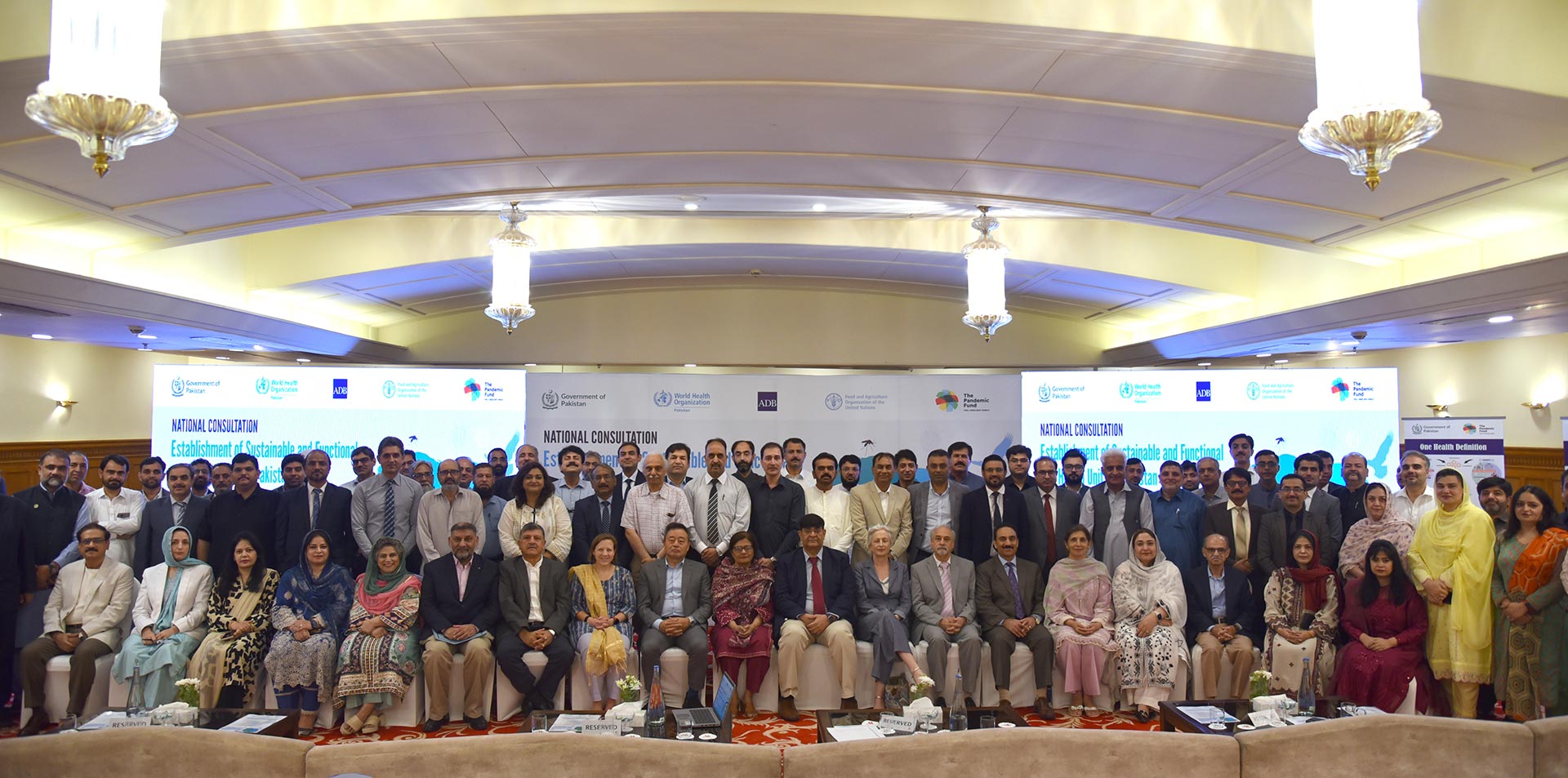Pakistan’s Pandemic Fund starts its implementation with a national high-level consultation to establish One Health units across the country
 DG Health, representatives of WHO, FAO, ADB, NIH and provincial and regional authorities during the national consultation held in Islamabad to establish One Health units across the country. Photo credit: WHO/Hamid Inam
DG Health, representatives of WHO, FAO, ADB, NIH and provincial and regional authorities during the national consultation held in Islamabad to establish One Health units across the country. Photo credit: WHO/Hamid Inam
29 June 2025, Islamabad, Pakistan – The World Health Organization (WHO), the Asian Development Bank (ADB) and the Food and Agriculture Organization (FAO) joined hands with the Government of Pakistan to start the implementation of Pakistan’s Pandemic Fund through a national consultation to establish One Health units across the country. The objective: strengthening pandemic prevention, preparedness and response capacities across the country to be ready to prevent and respond to future pandemics, protecting millions of lives.
The national consultation – held in Islamabad – was the first activity of an initiative funded by the Pandemic Fund to apply the lessons learned from the COVID-19 pandemic and strengthen the country’s One Health coordination and ability to ward off public health threats, thereby contributing to the preservation of public health at the regional and global levels. Under the leadership of the Ministry of Health, ADB, FAO and WHO are the implementing partners of Pakistan’s Pandemic Fund, while the National Institute of Health (NIH) will hold its secretariat.
Pakistan’s Pandemic Fund strategy – aligned with the National Action Plan for Health Security and the International Health Regulations (IHR) – emphasizes the One Health approach as an integrated framework that recognizes the interdependence of human, animal and environmental health to tackle complex health threats. Over 75% of emerging and endemic human infectious diseases originate from animals, compounded by rising antimicrobial resistance (AMR) and climate-driven disease spillovers.
“The Pandemic Fund represents a critical opportunity for countries such as Pakistan to enhance national capacities for pandemic preparedness, prevention, and response. In the wake of recent global health emergencies, it has become increasingly evident that a robust and integrated approach is essential to mitigate the impact of future pandemics. The interdependence of human, animal, and environmental health, compounded by the growing challenge of antimicrobial resistance, necessitates the adoption and operationalization of the One Health framework,” said Director General Health Dr Shabana Saleem.
“By strategically leveraging the resources provided through the Pandemic Fund, Pakistan can strengthen its surveillance systems, augment laboratory networks and expand community-level health interventions. Moreover, a coordinated, cross-sectoral response will not only improve our domestic health security but will also contribute meaningfully to global public health efforts. Implementing One Health as a guiding principle will enable us to develop sustainable, resilient health systems capable of addressing complex health threats and safeguarding the well-being of our population,” added Dr Saleem.
The national consultation facilitated discussions among over 70 participants, including partners, high-level representatives from the Ministry of National Health Services, Regulations and Coordination, the Ministry of National Food Security and Research and the Ministry of Climate Change and Environmental Coordination, as well as high-level authorities and experts from different provinces and regions.
The future One Health structures will be crucial to enhancing coordinated surveillance, early warnings regarding zoonotic and environmental threats, joint data sharing and training of the workforce across all sectors.
FAO Representative in Pakistan Florence Rolle lauded Pakistan’s momentum in addressing zoonotic risks, AMR and food safety through multisectoral collaborative platforms. “The Pandemic Fund presents a strategic opportunity to move from commitment to coordination and from planning to action through structures embedded within existing Government systems, with clear mandates, defined governance structures and multisectoral representation.”
“The devastating impact of the COVID-19 pandemic was a painful reminder that building stronger health systems and coordination to better prevent future pandemics is not an option anymore; it is the only way forward. WHO stands with Pakistan and its partners to be ready to save lives when the time comes,” said WHO Representative in Pakistan Dr Dapeng Luo.
“This consultation marks a critical step towards institutionalizing the One Health units that will serve as platforms for collaboration, data sharing and joint actions, ensuring that Pakistan is better prepared to prevent, detect and respond to future health threats,” said ADB’s Senior Project Officer Mansoor Ali Masood.
The meeting concluded with a joint commitment to establish a National One Health Secretariat with strong linkages to provincial coordination structures.
“It is an honour for the NIH to hold the One Health secretariat, and we will provide all the support to the implementing entities. This is a unique opportunity to build our core capacities, especially in terms of disease surveillance, workforce and lab systems. We have to enhance these capacities across the sectors”, said NIH CEO Dr Muhammad Salman.
Pakistan was awarded US$ 18.7 million from the Pandemic Fund to strengthen the country’s One Health coordination and ability to ward off public health threats. The project has catalyzed an additional US$ 4.1 million in co-financing and US$ 49.7 million in co-investment.
For additional information, please contact:
WHO
Ms Maryam Yunus, National Professional Officer – Communications, WHO Pakistan,
This e-mail address is being protected from spambots. You need JavaScript enabled to view it
(copying
This e-mail address is being protected from spambots. You need JavaScript enabled to view it
)
Dr José Ignacio Martín Galán, Head of Communications, WHO Pakistan,
This e-mail address is being protected from spambots. You need JavaScript enabled to view it
ADB
M Ismail Khan, Principal Communications Officer,
This e-mail address is being protected from spambots. You need JavaScript enabled to view it
FAO
M Riasat Wasee Ullah, National Project Coordinator,
This e-mail address is being protected from spambots. You need JavaScript enabled to view it



